Living with and beyond cancer: The improvement story so far - NHS ...
Living with and beyond cancer: The improvement story so far - NHS ...
Living with and beyond cancer: The improvement story so far - NHS ...
You also want an ePaper? Increase the reach of your titles
YUMPU automatically turns print PDFs into web optimized ePapers that Google loves.
42 | <strong>Living</strong> <strong>with</strong> <strong>and</strong> <strong>beyond</strong> <strong>cancer</strong>: <strong>The</strong> <strong>improvement</strong> <strong>story</strong> <strong>so</strong> <strong>far</strong><br />
In addition to this, a training<br />
programme on SPARC HNA was<br />
provided for relevant staff. This<br />
included a two hour session for all staff<br />
undertaking the assessments for the<br />
project work, delivered by clinicians<br />
from North Trent Cancer network as<br />
part of local roll out of HNA across the<br />
network. Sessions al<strong>so</strong> included project<br />
staff <strong>and</strong> user representatives.<br />
What difference has the testing<br />
work made or identified<br />
• Increased numbers of users engaged<br />
<strong>and</strong> involved in clinical pathway<br />
development<br />
• Provided SPARC HNA training for<br />
relevant staff as part of local roll out<br />
of HNA across the network<br />
• Patient information <strong>and</strong> support<br />
needs in survivorship have been<br />
identified <strong>and</strong> prioritised <strong>and</strong> a future<br />
plan for testing developed e.g. breast<br />
<strong>cancer</strong> open day<br />
• Identified <strong>so</strong>me common differences<br />
in individual patient need between<br />
different tumour sites e.g. type of<br />
issues highlighted by prostate<br />
patients tend to be more physical,<br />
however, breast <strong>and</strong> haematology are<br />
more related to emotional health<br />
• Identified logistical issues of<br />
undertaking HNA e.g. length of time<br />
to undertake varied from five to<br />
30 minutes in prostate to 30 to 105<br />
minutes in breast.<br />
Learning <strong>so</strong> <strong>far</strong><br />
• SPARC HNA training well received by<br />
staff trained on the whole. Users<br />
attending training were impressed by<br />
the thoroughness of the assessment.<br />
Feedback will inform future sessions<br />
• Results from SPARC HNAs completed<br />
showed that the assessments were<br />
very well received by patients <strong>and</strong><br />
al<strong>so</strong> very useful to guide<br />
development of models to test<br />
• Patient information <strong>and</strong> support<br />
needs scoping <strong>and</strong> prioritisation<br />
exercise valued by all group members<br />
especially user representatives<br />
• Logistical issues of undertaking HNA<br />
assessments needs to be borne in<br />
mind e.g. variation in time taken<br />
(ranged from five to 105 minutes)<br />
<strong>and</strong> availability of appropriate venue<br />
in which to undertake e.g. patient<br />
taken to <strong>cancer</strong> information <strong>and</strong><br />
support centre to find a confidential<br />
space<br />
• Availability of staff from busy rotas to<br />
undertake training <strong>and</strong> complete<br />
assessments extended the<br />
implementation time, despite<br />
offering several different<br />
opportunities for training<br />
• SPARC training for the project has<br />
helped to further the HNA<br />
implementation throughout the<br />
<strong>cancer</strong> network.<br />
Next steps<br />
• Patients who have been through the<br />
SPARC HNAs will be invited to<br />
participate in phase 2 of the Picker<br />
Experience Survey<br />
• To test an open day for breast <strong>cancer</strong><br />
patients in partnership <strong>with</strong> Breast<br />
Cancer Care <strong>and</strong> evaluate the<br />
content, location etc (patients <strong>and</strong><br />
carers invited)<br />
• HNA training for healthcare<br />
professionals identified as one of our<br />
testing models in order to ascertain if<br />
it is feasible to implement in the<br />
pathway, the barriers to<br />
implementation, what supports<br />
implementation <strong>and</strong> when to do a<br />
SPARC assessment<br />
• To test a haematology post transplant<br />
rehabilitation programme to ascertain<br />
whether quality of life, fatigue <strong>and</strong><br />
exercise tolerance can be improved<br />
<strong>with</strong> a weekly exercise group for<br />
myeloma patients post autologous<br />
stem cell transplant.<br />
Contacts<br />
Denise Friend<br />
Project Manager <strong>and</strong> Service<br />
Improvement Facilitator, North Trent<br />
Cancer Network .<br />
denise.friend@ntcn.nhs.uk<br />
Profes<strong>so</strong>r Sam Ahmedzai<br />
Test Site Lead <strong>and</strong> Profes<strong>so</strong>r of<br />
Palliative Medicine, Academic Unit<br />
of Supportive Care, School of<br />
Medicine <strong>and</strong> Biomedical Sciences,<br />
University of Sheffield<br />
pallmed@sheffield.ac.uk



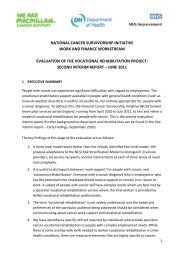
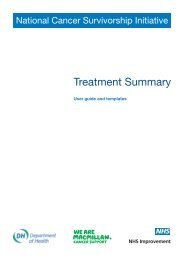
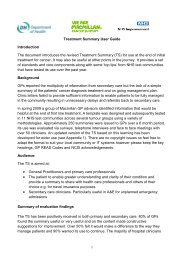
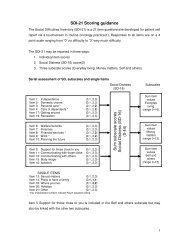
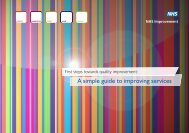
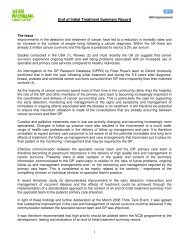
![Download the how to guide [PDF] - Macmillan Cancer Support](https://img.yumpu.com/47067428/1/184x260/download-the-how-to-guide-pdf-macmillan-cancer-support.jpg?quality=85)
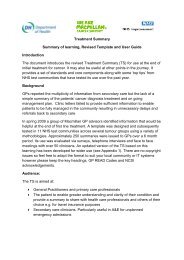

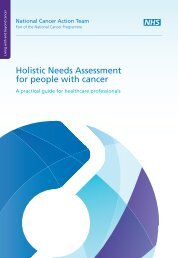
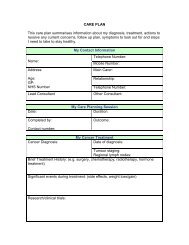

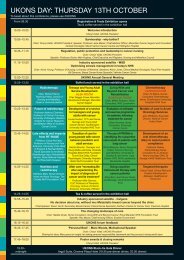
![HOPE Protocol [PDF, 420KB] - National Cancer Survivorship Initiative](https://img.yumpu.com/32566432/1/184x260/hope-protocol-pdf-420kb-national-cancer-survivorship-initiative.jpg?quality=85)